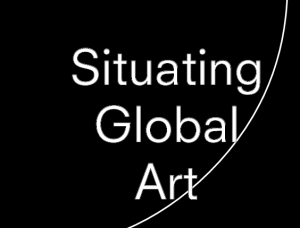Situating Global Art
February 12-14, 2015
Literaturwerkstatt Berlin
Knaackstr. 97, Berlin Prenzlauer Berg (Kulturbrauerei)
Since the early 1990s, the term “global art” has been established to call attention to poly-centered, plural, and transnational art worlds under postcolonial conditions. Yet, the process of globalizing art may also be criticized for producing its own hegemonic and exclusive effects.
The conference therefore brings into focus recent practices of art, curating, historiography and criticism that are connected to the global art discourse while at the same time attempting to queer or resist new hegemonic narratives.
Scrutinizing the dynamics that unfold between the institutionalization of “global art” and situated practices, “Situating Global Art” asks how contemporary local, traditional, indigenous, or tribal forms of artistic critique contribute to reconfigure notions of both the global and the local, thus challenging homogenizing conceptions of art in the age of globalization.
Program:
Thursday, February 12
SARAH DORNHOF
Panel I – Queering Artistic Practice
ISABEL SELIGER (BERLIN):
The Art of Globalization/The Globalization of Art:
Creating Transnational, Interethnic, and Cross-Gender
Identities in the 3D Work of Miao Xiaochun
RONIT MILANO (BEER-SHEVA):
Globalization, Colonialism and Takashi Murakami
BIRGIT HOPFENER (BERLIN):
Qiu Zhijie’s Concept of Total Art.
A Case Study of Transculturally Situating Discourses of Integrated Art Practice
Discussion
Lunch
Panel II – Engaging with Institutions
VOON POW BARTLETT (LONDON):
‘Harmonious Society’ and ‘There is nothing new under the Sun’
FELIX VOGEL (FRIBOURG):
Global Art since the 1960s seen from Bahia
Coffee
JELLE BOUWHUIS (AMSTERDAM):
How Far How Near. Or:
Where to Locate Global Art within a Modern Art Museum
JEAN BORGATTI (BENIN/BOSTON):
Why Global? Why Now?
African Art at the Fitchburg Art Museum
Discussion
Break
Keynote:
ABDELLAH KARROUM (MATHAF, ARAB MUSEUM OF MODERN ART, DOHA):
Generation 00:
The Artist as Citizen
Friday, February 13
Coffee
Panel III – Urban Interventions
GÜRSOY DOGTAŞ (MUNICH):
The 13th Istanbul Biennale and the Squatters’ Movement of Gezi Park in an Ideological Competition for the Practice of Radical Democracy
BIRGIT MERSMANN (BREMEN):
Lacing Places.
Situative Practices and Sociopolitical Strategies in Korean Urban Art Projects
Discussion
Coffee
Panel IV – Media as Translation
ANTIGONI MEMOU (LONDON):
Global Photography:
Notes on the ‘Documentary Turn’ in Contemporary Art
KATJA GLASER (SIEGEN):
The ‘Place to be’ for Street Art Nowadays no longer is the Street, it’s the Internet
Discussion
Lunch
Panel V – Ethics of Art Mediation
TONI HILDEBRANDT (BERN):
Situating the Withdrawal of Tradition:
Jalal Toufic’s rejection of Pasolini’s Southern Answer
CLAUDIA MARION STEMBERGER (MONTRÉAL):
On the Pedagogy of Global Art Histories
Coffee
INSA VERBECK (KASSEL):
Improving, Representing, and Imagining –
Documenta’s changing Relations to the World
BARBARA LUTZ (HILDESHEIM):
Curating Transculturality.
documenta 12 and the ‘Migration of Form’
Discussion
Break
Keynote:
ANNETTE BHAGWATI (HAUS DER KULTUREN DER WELT, BERLIN) On Centers, Nodes and Trajectories:
Changing Topologies in Transcultural Curating
Panel VI – Politics of Labelling
MATEUSZ KAPUSTKA (ZURICH):
East feeds West:
The Curse of Different Temporalities
JANNA-MIRL REDMANN (GENEVA):
Boycotting the Global –
52 Weeks of Artist Protest
DAVID FROHNAPFEL (BERLIN):
Disobedient Museality:
Atiz Rezistans and the Politics of Artistic Poverty Tourism in Port-au-Prince
Discussion
Lunch
Panel VII – Contesting Narratives
ORIANNA CACCHIONE (SAN DIEGO):
To Wash a Book and to Burn the Beard –
Conceptualizing Art History as a Readymade in Huang Yong Ping’s Artworks
GEORGE FLAHERTY (AUSTIN):
Destroying Art of the Americas Amid a Global Turn
Coffee
ANDREW WEINER (NEW YORK):
The Scrim, the Pistol, and the Lectern:
Dis-situating the Global Contemporary
JACOB BIRKEN (KARLSRUHE):
When Transfers become Entanglements.
Contradictory Sites of Artistic production & Reception in a Globalized World
Discussion
Closing Remarks


